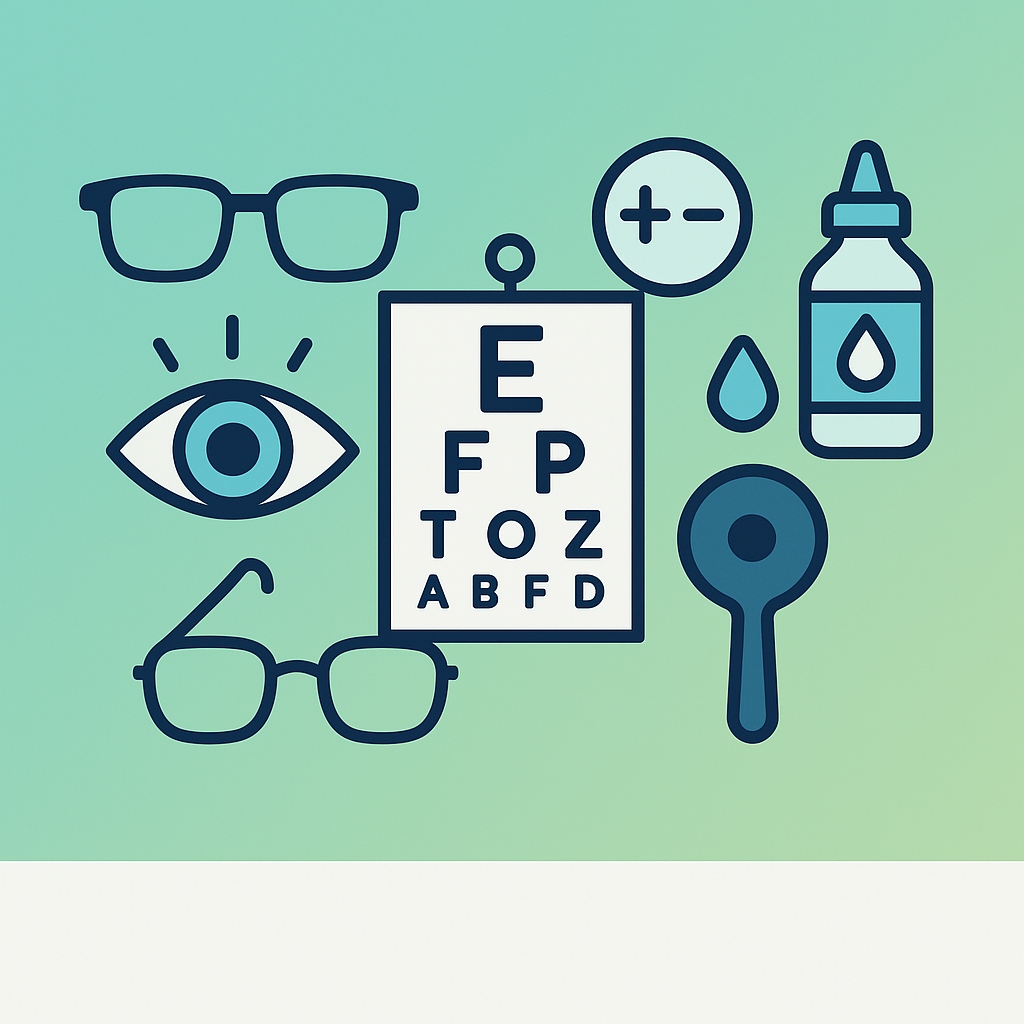Introduction
Choosing the best eye doctor for your company’s vision care is a crucial decision that impacts workplace health, productivity, and satisfaction. Whether your organization is establishing a comprehensive vision care plan, selecting a local provider, or partnering with platforms like GoKlaim, the right choice ensures your team receives quality eye and vision care backed by expert staff and modern equipment.
What Makes a Great Eye Doctor for Employee Vision Care?
A great eye doctor combines clinical expertise, a broad service offering, and organizational reliability: critical factors for corporate vision care success. When evaluating options, prioritize these core elements:
- Qualifications & Experience:
Top-rated eye doctors and clinics have board-certified optometrists and ophthalmologists with proven track records in routine and specialist vision care. Look for providers who have a proven track record in diagnosing and treating conditions such as glaucoma, cataracts, and macular degeneration. Experienced practitioners are better equipped to handle complex cases and provide personalized care that aligns with employee health needs. - Comprehensive Services:
A great provider offers a full range of services to meet diverse employee needs. This includes routine eye exams, advanced diagnostic screenings such as retina imaging and glaucoma tests, emergency eye care, pediatric and senior eye services, and same-day appointments for urgent issues. Offering a wide range of services ensures employees can receive all necessary care under one roof, improving convenience and adherence to wellness programs. - Technological Resources:
Modern eye care relies on cutting-edge technology for accurate, efficient, and early diagnosis. Providers should leverage advanced diagnostic equipment, digital imaging tools, and electronic health record systems to streamline exams and track employee vision health over time. High-tech practices not only improve outcomes but also reduce wait times and administrative friction for both employees and HR teams. - Accessibility & Convenience:
Ease of access is crucial for employee engagement in vision care programs. Consider providers that are conveniently located, offer flexible scheduling, accept multiple insurance plans, and provide digital portals for appointment booking and records management. Location-specific searches such as "best eye doctor near me in [City]" can help identify providers who are geographically convenient for your team. - Patient Experience:
Employee satisfaction is closely tied to patient experience. Evaluate eye care providers based on reviews, ratings, and testimonials to understand reliability, communication quality, and comfort during visits. Positive patient experiences increase adherence to annual check-ups and other preventive care measures, contributing to overall workforce wellness. - Cost Transparency:
Clarity on pricing is essential for corporate vision care programs. Ensure providers clearly communicate the costs of routine eye exams, advanced screenings, eyewear, and any out-of-pocket expenses. Compare affordable versus premium options and confirm insurance coverage. Transparent information on eye exam costs helps employees make informed decisions without unexpected financial surprises and enhances trust in your benefits program.
By focusing on these, companies not only ensure quality vision care for employees but also maximize organizational return on investment in employee wellness initiatives.
Understanding Your Options: Types of Eye Doctors
When it comes to optical eye care, employers and employees often ask:
Ophthalmologist vs. Optometrist: What’s the Difference?
An optometrist is a Doctor of Optometry (OD) who provides eye exams, vision screening, prescribes glasses/contacts, and diagnoses or manages eye diseases that do not require surgery. An ophthalmologist is a Medical Doctor (MD/DO) with a specialty in eyes. They offer full eye exams, all diagnoses, prescriptions, LASIK surgery consultation, surgical procedures, and care for complex eye diseases. An optician has technical training and is certified to fit and sell glasses or contact lenses but does not diagnose or treat eye conditions.
- Optometrists handle most vision care and non-surgical eye health needs.
- Ophthalmologists are essential for complex disease management and surgical care.
When designing an employee vision benefit, it’s wise to select a clinic or network providing both optometrists and ophthalmologists to ensure seamless referrals and comprehensive coverage.
Key Factors When Choosing an Eye Doctor for Your Business
1. Expertise and Credentials
- Choose providers with experience in workplace eye care, offering routine eye exams, vision screening, and treatment for common issues like dry eye or digital eye strain.
- Verify licensure, board certification, and ongoing professional education.
- For pediatric eye care or senior eye care, ask about specialized training for these populations.
2. Range of Services
A modern eye clinic should offer:
- Comprehensive Eye Exams: Evaluate overall eye health, vision prescription, and early signs of disease.
- Advanced Screenings: Glaucoma screening, retinal imaging, diabetic retinopathy checks.
- Specialized Care: Dry eye treatment, contact lens exams, LASIK consultations, emergency eye care.
- Pediatric and Senior Services: Age-specific care, from children’s vision correction to senior eye disease management.
- Same-Day Eye Exams: Convenient slots for urgent or last-minute employee needs.
3. Technology and Equipment
Practices with state-of-the-art diagnostic tools (OCT, retinal cameras, digital phoropters) deliver more thorough and efficient eye and vision care, supporting routine and complex employee needs.
4. Convenience and Accessibility
- Opt for clinics that offer multiple locations, extended hours, and easy appointment scheduling: critical for large or shift-based workforces.
- Consider providers with accessible branches in major cities (e.g., “best optometrists in Toronto,” “eye clinic in Los Angeles,” “ophthalmologist London,” or “optometrist in Vancouver”).
- Assess telehealth or virtual screening options for remote or hybrid employees.
5. Insurance and Affordability
- Select clinics with experience handling employer-sponsored insurance or vision plans, reducing administrative headaches.
- Compare eye exam costs and look for transparent pricing: some clinics offer bundled corporate rates or affordable eye doctor packages.
6. Patient Experience and Reputation
- Review eye doctor ratings, patient testimonials, and independent best eye doctor reviews.
- Inquire about employer references or corporate case studies.
Corporate Vision Care Models: Private Practices vs. Chains vs. Technology Platforms
Understanding the pros and cons of each model helps companies tailor vision care strategies.
Private practices offer personalized, flexible, and consistent care with advanced technology, but they have limited locations and less corporate infrastructure. Optometry chains or franchises have a broad geographic reach, strong logistics, and standardized service, but they may be less personalized and have longer wait times. Specialty eye hospitals or clinics provide extensive specialist resources and advanced surgeries but can be costlier and offer less routine care. Leading benefits platforms like GoKlaim stand out by providing centralized booking, digital claims, and seamless reporting, but are dependent on network size.
GoKlaim stands out by integrating provider networks with digital claims processing and flexible scheduling: ideal for companies seeking a scalable, tech-forward approach to employee vision care.
Comparison: Affordable vs. Premium Eye Care Providers for Companies
When it comes to coverage, an affordable eye doctor typically offers basic routine exams and glasses or contacts. A premium eye doctor provides comprehensive exams, specialist referrals, and advanced screenings. For technology, affordable options have standard equipment, while premium providers use the latest diagnostic tools. Regarding convenience, affordable doctors have standard office hours, while premium ones offer extended hours and telehealth. The employee experience with an affordable doctor is functional, while a premium doctor provides high-touch care with a wellness focus. Finally, the cost for an affordable doctor is lower, making it suitable for large workforces, while the cost for a premium doctor is higher but comes with added value through perks and wellness.
How to Find the Best Eye Doctor Near Your Office
- Use Search Queries and HR Tech Platforms: Start by performing location-based searches using phrases such as "best eye doctor near me" or “corporate vision care providers near [City].” Additionally, leverage corporate HR technology platforms that track benefits providers and employee feedback. These tools often provide curated lists of local optometrists and ophthalmologists who are experienced in serving corporate clients.
- Check Patient Reviews and Ratings: Patient reviews offer valuable insights into the quality of care and overall experience. Compare local clinics by their ratings on Google, Yelp, or specialized healthcare review sites. Pay attention to comments about appointment scheduling, bedside manner, communication, and thoroughness of exams. High-rated providers are more likely to deliver consistent, reliable care for your team.
- Consult Your Employee Network: Your employees can be a great resource when selecting an eye doctor. Encourage them to share personal experiences or referrals. Firsthand feedback can highlight providers who are particularly attentive, convenient, or responsive, helping you identify clinics that align with your team’s expectations.
- Look for Corporate Wellness Packages and Onsite Vision Screening: Many eye care providers offer corporate wellness packages tailored for organizations. These may include on-site vision screening days, bulk appointment scheduling, and discounted services for employees. Onsite vision screening programs make it easier for employees to participate, reduce downtime, and demonstrate your organization’s commitment to proactive health care.
Why Is Regular Eye Care Important for Employees?
Regular eye care and vision screening help detect subtle eye changes, prevent major diseases, address digital eye strain from screens, and support company wellness targets. This, in turn, leads to fewer absences, reduced health costs, and higher morale.
How to Prepare for an Employee Eye Exam Initiative
- Communicate the benefit: Highlight why routine eye exams matter.
- Schedule at convenient times: Offer same-day and flexible slots.
- Provide details: Share what is included in a comprehensive eye exam and how to prepare (e.g., bring current prescriptions, list symptoms).
- Encourage participation: Make the process easy and stress-free.
Conclusion: Building the Right Vision Care Partnership for Your Company
Choosing the best eye doctor for you r company’s employee vision care means aligning clinical expertise, modern technology, patient experience, and flexible access. By considering provider type, geographic reach, cost-effectiveness, and technology integration: especially through solutions like GoKlaim: your organization delivers a valued benefit, supports wellness, and demonstrates true care for its workforce.
Empower Your Team with Better Vision Benefits
Simplify claims, monitor spending in real time, and enhance employee wellness with GoKlaim’s digital platform.
Frequently Asked Questions (FAQs)
How often should I get an eye exam?
Adults should have an eye exam every 1–2 years, but more frequent checkups may be recommended for those with existing eye conditions, risk factors, or vision changes.
What does a vision test include?
A vision test typically measures sight clarity, checks for common eye disorders, screens for diseases like glaucoma, and may evaluate eye muscle function and pressure.
Can I get an eye exam without insurance?
Yes, many clinics offer out-of-pocket payment options or affordable packages for patients without insurance.
Is an optometrist the same as an ophthalmologist?
No; an optometrist focuses on vision care and routine eye health, while an ophthalmologist is a medical doctor who can diagnose, treat, and perform surgery for complex conditions.
How to find the best eye doctor near me?
Look for top-rated eye clinics or use employer partnerships with platforms like great eye doctor for recommendations and easy booking.
What are the signs of eye problems?
Signs can include blurred vision, double vision, eye pain, persistent redness, sudden changes in vision, or frequent headaches.
Why is regular eye care important?
Routine eye care detects problems early, protects vision, and supports overall employee wellness and productivity.
How much does an eye exam cost?
Costs vary by provider and services, but routine eye exams typically range from affordable to premium, depending on the clinic and location.
Where can I get a same-day eye exam?
Many local eye clinics, chains, or urgent optical centers offer same-day appointments: search “same-day eye exam near me” for options.
What is included in a comprehensive eye exam?
A comprehensive eye exam includes vision testing, eye pressure measurement, retinal and corneal health checks, and screening for diseases.










 CompanyContact us
CompanyContact us






























